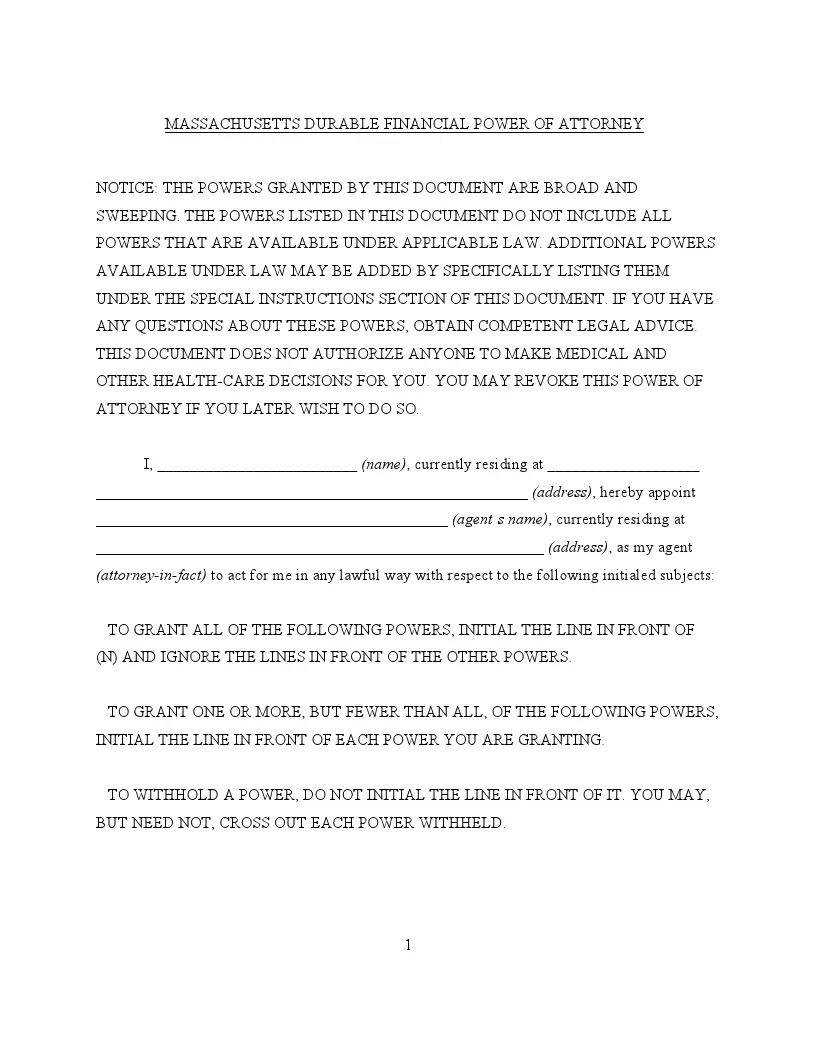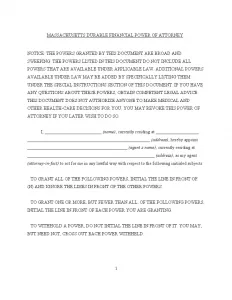Free Massachusetts Durable Power of Attorney Form
In every state of the USA, including Massachusetts, it is a common practice to fill out a Durable Power of Attorney Form before family members have to make tough end-of-life decisions on behalf of their close ones. The document prevents them from any confusion and ensures that all their financial matters are taken care of if their close relatives become incapacitated. The durable power of attorney form allows an individual to appoint a person who will take responsibility for dealing with financial issues (paying the bills, purchasing or selling property, etc.) if the individual experiences serious mental and physical health problems and becomes incapable of making decisions themselves. Keep in mind that, unlike a medical power of attorney form, this document is not meant for making legal healthcare decisions.
Massachusetts power of attorney forms – this page can help you learn more about some other powers of attorney you can use in Massachusetts.

Build Your Document
Answer a few simple questions to make your document in minutes
Save and Print
Save progress and finish on any device, download and print anytime
Sign and Use
Your valid, lawyer-approved document is ready
Ensure that a person you want to appoint as an agent is someone you trust most and is unlikely to take advantage of the situation. Your decision should not be spontaneous. Weigh all the considerations carefully when selecting an attorney-in-fact. According to Section 190B:5-501 of Massachusetts General Law, the form is “durable” because it remains in effect even when you pass away or are on the verge of death due to some severe health problems causing incapacity. However, you can revoke the form or limit the agent’s authority at any time as long as you are of sound mind and able to make decisions yourself.
There are several options that you have when designating an agent. The main requirement you are to meet is choosing an adult person (who is 18 years old or older) who is financially competent. An attorney-in-fact can be:
- your close and trustworthy friend;
- your close relative;
- a professional agent or business entity.
Massachusetts Signing Requirements and Laws
Although there are no statutes concerning signing requirements, the state requires that the principal who is to sign the document and the agent should be no younger than 18 years old. Thus, the laws stated in Section 201D:2 regarding the appointment of a healthcare agent can be applied to this form. However, the state law does not require that the form be signed in the presence of witnesses. Only the acknowledgment of the form by a notary public is mandatory.
The DPA form in Massachusetts allows a principal to let their attorney-in-fact to manage the majority of possible operations related to finances. The list provided in the form comprises the following issues:
- Business and banking related operations;
- Taxes;
- Insurance;
- Real and personal property transactions and operations;
- Retirement plan operations;
- Operations related to making gifts or grants.
A principal can give access and authority to either all of the financial affairs provided or a limited number of the tasks. You can give your attorney-in-fact personal instructions and inform them about the specific requirements that they are to meet while performing your financial tasks.
It is essential that you read all the statements in the form carefully as the document imposes a huge responsibility on the agent and protects your property and other finances. Make several copies of the documents, for you may need them to provide your family members and attorney-in-fact themselves with the completed and signed form.
Massachusetts Durable Power of Attorney Form Details
| Document Name | Massachusetts Durable Power of Attorney Form |
| Other Names | Massachusetts Financial Durable Power of Attorney, MA DPOA |
| Relevant Laws | Massachusetts General Laws, Chapter 190B, Article 5 |
| Signing Requirements | Two Witnesses |
| Avg. Time to Fill Out | 10 minutes |
| # of Fillable Fields | 37 |
| Available Formats | Adobe PDF |
Popular Local Durable POA Forms
POA templates are among the most widely downloaded ones within the US. Take a look at probably the most requested durable POA papers.
Steps to Complete the Form
Once you have got acquainted with all the requirements and laws, you can proceed to complete the document. Unlike the majority of DPA forms in other states consisting of six pages, the form in Massachusetts is four pages long, so it will not take much of your time to fill it out. For a better understanding of how to fill it out, read the following step-by-step instruction.
- Download the DPA Form
First and foremost, the process of completing the form starts with obtaining the template. You can make use of our form building software that helps you to download the form very quickly. Keep in mind that you are allowed to input the information on a computer or laptop, but you are to print the document to sign it.
- Insert Personal Details of the Principal and the Agent
In Massachusetts, the form begins with the principal’s statement in which they appoint an agent. The principal is to insert their own and the agent’s full name and address (street, county, state).

- Choose the Applicable Effective Date
In the next section of the document, the principal is to choose a paragraph that describes in the best way on what date the principal wants an agent to get access to all principal’s financial operations. There are two options: the agent’s authority comes into effect right after the form is signed or after the principal’s doctor signs the document.

- Give Your Attorney-in-Fact General or Limited Powers
Read the list of the responsibilities that you can delegate to your agent carefully and choose those financial operations you want to entrust to your attorney-in-fact. You can insert your initials in the spaces near the power you want to assign to your agent. The Massachusetts DPA form allows you to choose from the following 14 actions and operations:
- Banking and operations in other financial institutions;
- Getting access to the principal’s safe deposit box;
- Making loans and lending money;
- Managing benefits from the government;
- Retirement plan operations;
- Paying taxes;
- Insurance matters;
- Family and personal maintenance;
- Taxes;
- Real estate operation;
- Personal property matters;
- Managing property affairs;
- Making gifts;
- Obtaining and paying for legal advice.

- Add Special Instructions
If you have nothing to add to the instructions mentioned above, you can write “None” in the lines below. If you are satisfied with the provided instructions, write them in the blank lines. It helps to avoid misunderstandings and confusion between the parties.

- Read the Statements Carefully
Before signing the document, read all the statements several times to make sure that you have understood all of them. If something remains unclear to you, consult your lawyer.
- Sign the Document and Insert the Date
After you have read all the conditions, you can sign the paper at the bottom of the third page. Do not forget to insert the date on which you execute the Durable Power of Attorney.

- Ask Notary Public to Verify the Document
The form must be acknowledged and signed by a notary public. The notary agent must insert the date of the form’s execution and the place in which it took place.

- Provide The Agent’s Signature
In this part of the document, the appointed attorney-in-fact must agree with all the responsibilities that have been imposed on them and provide their signature.
- Ask the Notary Public to Acknowledge the Agent’s Agreement
This time the notary public must provide their signatures to prove that the agent has agreed with all the conditions and responsibilities.

Check out our document builder to personalize any template offered on FormsPal to your requirements. Here is a range of some other printable Massachusetts documents we offer.
Download a Free Massachusetts Durable Power of Attorney Form
